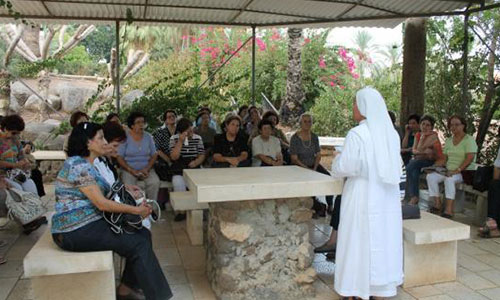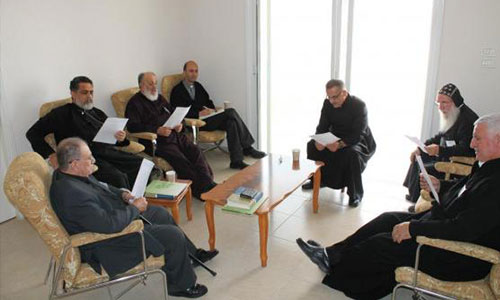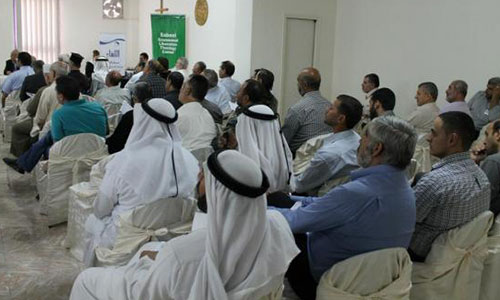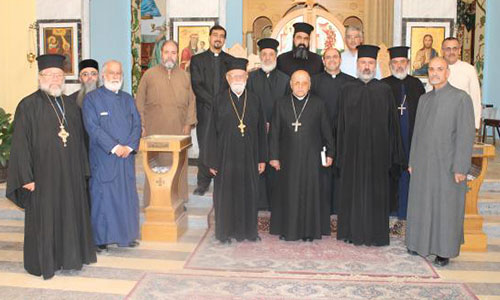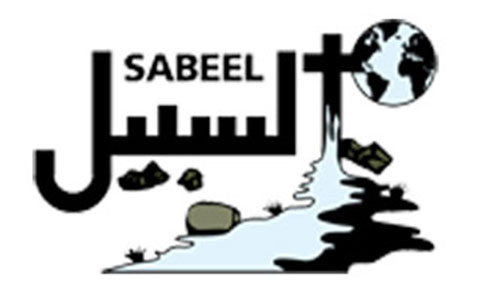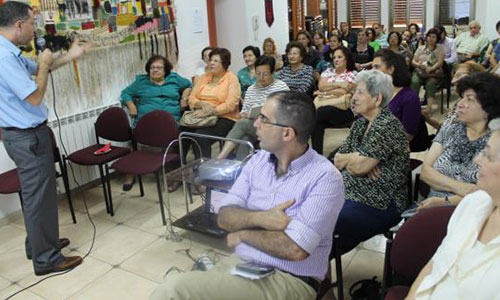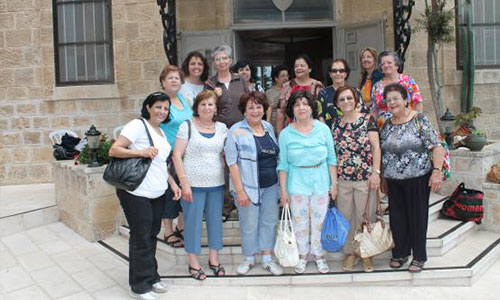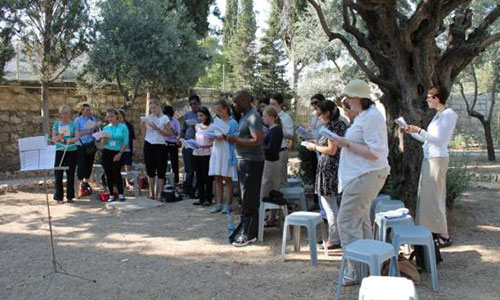
Day 6 of Sabeel’s International Young Adult Conference:
Key words of the day Hebron, courage, singing, weeping, Jewish and Israeli solidarity, Christian Peacemaker Teams, Ecumenical Accompaniment Programme in Palestine and Israel, Susiya village.
How does the (biblically based) folk song go? “A time to weep, a time to laugh.” Despite the warmth, courage, humor, and steadfastness we witnessed today in Hebron and Susiya village, today felt to many of us as a time for weeping. The severity of the occupation including regular harassment from soldiers and closed (even welded!) storefronts, among other factors, helped us understand another piece of the story of the struggle for justice and sovereignty in Palestine. Visiting Susiya village, where after decades of harassment and settler violence, there are immanent and pending demolition orders to level the TENTS of the families there, was a second shock to the system. It was such a gift to be with them and we were also relieved to come back to the hotel and try to process everything we had seen. We continue to help one another wrestle with all the good feelings (sadness, anger, confusion, fear) that came up today. We thank our friends Issa (our guide from Hebron) and Moriel and Alana (from Rabbis for Human Rights, among other great projects) for walking with us in all of it. For more information on Hebron please see the article below (detailing important findings by a Jewish human rights organization). For more on the immanent and pending demolition orders on Susiya, see Stand with Susiya – No to Demolition.
Day 5 of Sabeel’s International Young Adult Conference:
Everyone enjoyed sleeping in late this morning before our special tour of the Nativity Church in Bethlehem, the site where it is thought that Jesus was born. Following (Roman Catholic) services we had a chance to explore the city of Jesus’ birth. Some of us visited an olive wood carving workshop while others had a tour of the Arab Women’s Union- we all had a lot of fun. Then it was off to Tent of Nations where there was more time for taking walks, journaling, and playing soccer. (Boy, if this is the revolution, sign me up;)) Kathy Nichols gave us a fantastic session on advocacy and we wrestled with the challenges of sharing our experiences here when we return home. Daoud Nassar took time to speak with us (one day before their special children’s summer camp!) about his family history on the property of the Tent of Nations, the struggle to keep the land despite harassment of every kind (legal abuse, property damage, increased isolation in the form of roadblocks, demolition orders for his tents and cisterns) and his incredible commitment to nonviolent resistance and bridge building. For more information on Tent of Nations (including their groundbreaking work to create financially and environmentally sustainable and self-sufficient community) and to support their work please visit: Stop the Nassar Family Farm/Tent of Nations Demolition (http://www.tentofnations.org/)
Day 4 of Sabeel’s International Young Adult Conference:
We spent the day at Aroub Refugee Camp. One of our participants has written a fantastic summary and reflection of the day. Check it out here: http://anikoinjerusalem.wordpress.com/
Day 3 of Sabeel’s International Young Adult Conference!
Today was our first full day with all of our participants and we’re really going now. After a great morning devotions led by Sarah Thompson, Omar Haramy gave us a quick overview of the political situation on the ground and then we departed for a two hour briefing with the United Nations Office for the Coordination of Humanitarian Affairs (OCHA). After a relaxing lunch at the Jerusalem Hotel (maklube, minty lemonade, Arabic coffee and baklawa- yum!) former Sabeel staff and all-around powerhouse Nora Carmi led us through Sabeel’s Contemporary Way of the Cross and then we left Jerusalem for Bethlehem. Key words of the day? The Nakba of 1948, refugees, settlements, checkpoints, Gaza, the wall, and international law. Yesterday we followed Jesus footsteps through Jerusalem; today we learned how he walked among the Palestinian people through the history of the occupation. A highlight of the day for everyone was meeting with a Palestinian family fighting to keep their home in Silwan; 1,500 people are at risk of being displaced for the sake of building a public garden (it is thought by some that King David may have had gardens in the area). The stark irony of planning to landscape lush gardens on the grounds where others have planted the seeds of their families, their memories, their hope- their homes!- was breathtaking, heartbreaking, and a challenge to us all. “What will the fourteenth station be?” The poem, “They have challenged us with Resurrection” by Julia Esquivel (Contemporary Way of the Cross, p. 48) says: There is something here within us which doesn’t let us sleep, which doesn’t let us rest, which doesn’t stop the pounding deep inside. It is the silent, warm weeping of women without their husbands it is the sad gaze of the children fixed there beyond memory… What keeps us from sleeping is that they have threatened us with resurrection! Because each nightfall though exhausted from the endless inventory of killings for years, we continue to love life, and do not accept their death! In this marathon of hope there are always others to relieve us in bearing the courage necessary… Accompany us then on this vigil and you will know what it is to dream! You will then know how marvelous it is to live threatened with resurrection! To live while dying and to already know oneself resurrected. Amen! Stay tuned for tomorrow’s update!
Day 2 of Sabeel’s International Young Adult Conference has come and gone.
Today’s highlights included a tour of the Old City, the most delicious falafel sandwiches in town, and an opening worship service in the Garden of Gethsemane. (Yeah, *that* Garden of Gethsemane.) During our tour, we counted security cameras, Israeli soldiers & flags, heads (our own), and of course, new friends from some 14 countries. (Way to go, Sabeel outreach effort!) While Omar led us at a super brisk pace and roundly ignored our pleas to slow down, we only lost two participants to the human soup that is the Old City and we think they’ll make a fantastic contribution to whatever street corner we forgot them at. (Just kidding! Nadine Bitar, Nicolas Sous, and Sarah Thompson did a great job of leading the back of the group.) Sabeel Board and Executive Council member Salwa Duaibis profoundly moving sermon shook us awake and encouraged us deeply as we prepared for the 10 days ahead. (Excerpt coming soon!) On our way back from worship, we walked passed a Palestinian family arduously moving into their new apartment and we all pitched into help, carrying couch cushions and laundry bags and boxes up the Cobblestone Street and right into their home! (These are the kinds of crazy and wonderful things you can expect when you’re hanging around Sabeel folks.) By nightfall, every participant had finally arrived in the country, completing our circle and promising an even better day tomorrow.
Day 1 of Sabeel’s 7th Young Adult Conference has come to a close!
Everyone set to arrive today did and we had a great dinner and first evening together at Knights’ Palace Hotel in the Old City of Jerusalem. One high point was playing a special Sabeel version of pin-the-tail-on-the-donkey! We each shared our last experience with a donkey (hilarity ensued): “Wanted to take a picture but I ended up running away from it.” Nicholas “Fell from a donkey at 7 years.” Bonganjalo Mbenenge
“Seeing a donkey walking with children in the streets of Old Jerusalem.” Janelle “Learning that it’s never a good idea to take a donkey into a church.” Nicola “Having to listen to a donkey about to give birth. For 3 weeks…” Emma.
